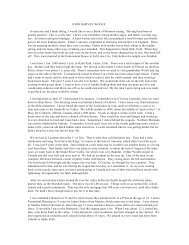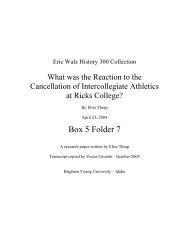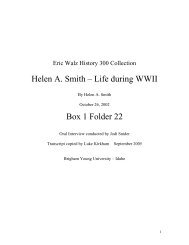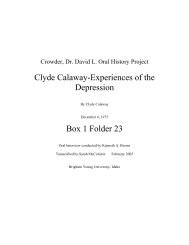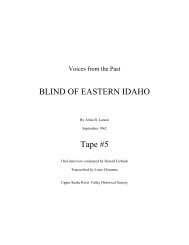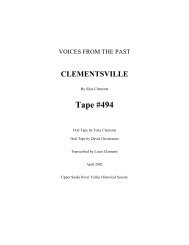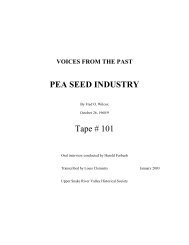HelPeR - BYU Idaho Special Collections and Family History
HelPeR - BYU Idaho Special Collections and Family History
HelPeR - BYU Idaho Special Collections and Family History
You also want an ePaper? Increase the reach of your titles
YUMPU automatically turns print PDFs into web optimized ePapers that Google loves.
A o ph g t a<br />
m g i x l n w<br />
e w a a f i<br />
o e i y r<br />
Never store film in a non-archival container, such<br />
as, manila envelopes or common plastic bags. Nonarchival<br />
containers are constructed of acidic materials<br />
that can destroy precious heirlooms by trapping<br />
them in a polluted environment. Also avoid plastic<br />
bags because they contribute to high humidity.<br />
Archival boxes <strong>and</strong> envelopes are inexpensive <strong>and</strong><br />
provide an alkaline reserve buffer that prevents contamination<br />
by nearby items.<br />
One of the primary signs of film decomposition<br />
is the so-called “vinegar syndrome.” The syndrome<br />
occurs when the acetate in the film breaks down<br />
into acetic acid <strong>and</strong> releases a vinegary smell <strong>and</strong><br />
white powder. Afflicted home movies should be<br />
segregated from other films in their own containers<br />
because acetic acid fumes can actually accelerate the<br />
destruction of nearby items. The vinegar syndrome<br />
is an irreversible condition that will eventually destroy<br />
precious memories. Infected materials need<br />
to be refrigerated to slow the process of decomposition<br />
<strong>and</strong> transferred to a digital medium as soon as<br />
possible. Fortunately, videotapes do not suffer from<br />
the vinegar syndrome, but they do have their own<br />
unique storage rules.<br />
VHS <strong>and</strong> BETTA tapes consist of magnetically<br />
charged particles bound to a polyester backer with<br />
a polyurethane binder. The tape’s magnetic encoding<br />
necessitates that they be stored far away from<br />
any magnetic fields, including the magnetic fields<br />
produced by your television set.<br />
All tapes should be housed in archival containers<br />
at room temperature <strong>and</strong> in moderate humidity.<br />
V o e e o o i<br />
Never store tapes rewound, for rewinding imparts<br />
inconsistent tight <strong>and</strong> loose spots throughout the<br />
reels. Over time these inconsistencies contribute to<br />
breakage. Furthermore, treasured tapes should never<br />
be paused.<br />
Like rewinding, pausing stresses the polyester<br />
backer, <strong>and</strong> over time it can snap. All video recordings<br />
are ephemeral products that will not last more<br />
than a couple of decades <strong>and</strong> need to be converted to<br />
digital format, but the conversion of both video tapes<br />
<strong>and</strong> film to a modern viewable system should begin<br />
only after properly archiving the original materials.<br />
The Conversion Process<br />
The various film-to-DVD conversion houses on the<br />
Internet range from decent bargains to expensive ripoffs.<br />
Even Hollywood grade film transfer companies,<br />
like DuArt Film <strong>and</strong> Video, provide digital conversion<br />
services from Super 8 <strong>and</strong> 16mm because these<br />
film types are still used by avant-garde artists <strong>and</strong><br />
professionals. It is best to send talkies (sound films)<br />
to a professional company like DuArt because most<br />
Internet transfer houses are incapable of properly<br />
synching speech to the motion of the footage. Film<br />
owners can avoid much heartbreak <strong>and</strong> financial distress<br />
can by arming themselves with information on<br />
the process of updating to a digital format.<br />
Film owners should always apply Stanford University’s<br />
LOCKSS archiving maxim when transferring<br />
precious memories to digital. In short, LOCKSS<br />
st<strong>and</strong>s for Lots of Copies Keep Stuff Safe. Applying<br />
the LOCKSS system, it is best to have all motion pictures<br />
digitized <strong>and</strong> placed on both an external hard<br />
drive <strong>and</strong> a mini DV tape rather than just on a DVD<br />
Ja n ua ry/Fe b r u a r y 2009 Ev e r t o n’s Ge n e a l o g i c a l He l p e r © 27



